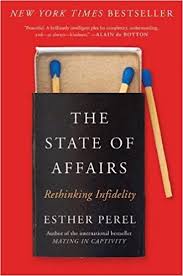Figuring Out Fidelity
There’s a certain category of book that I think of as “airport nonfiction.” These paperbacks – and they are almost always paperbacks because they’re on their umpteenth printing – are accessibly written, drawn on some research or professional activity, and go light on the argumentation and the footnotes. They most resemble long magazine articles, pieces that you might read in The New Yorker or The Atlantic. You find airport nonfiction in a doctor’s office periodical and want to spirit it home to read at your leisure. They’re engaging and interesting. We read them because they appeal to our curiosity and so many other folks read read them. And when we finish airport nonfiction, we are not necessarily any wiser for it. They are a bit like a tasty appetizer: enjoyable and a good conversation starter but not terribly filling.
 An excellent addition to this category is Esther Perel’s The State of Affairs: Rethinking Infidelity. Perel is a therapist who focuses on couples and sexuality. Already a successful author, she gave a very popular TED talk on infidelity before publishing the book. She’s smart, extremely media savvy, and knows how to share a good anecdote.
An excellent addition to this category is Esther Perel’s The State of Affairs: Rethinking Infidelity. Perel is a therapist who focuses on couples and sexuality. Already a successful author, she gave a very popular TED talk on infidelity before publishing the book. She’s smart, extremely media savvy, and knows how to share a good anecdote.
Who isn’t interested in relationships? No one has them figured out and no one ever really understands anyone else’s marriage or “coupledom.” Perel writes about affairs – the loss of trust and fidelity – from a privileged perspective. As a therapist who specializes in relationships and sexuality, she hears from couples and from individuals about their loves, their fears, their hopes and their pains. They tell her all to her. Perl seems to be an outstanding listener. She’s a very good writer.
Perel’s perspective is global and analytical. She wants her clients to be healthy and happy, and and that leads her to wondering why Americans hate infidelity so much. Every culture frowns upon infidelity but It turns out that relative to other countries, Americans are much more likely to condemn cheaters. Perhaps it is our lingering puritanism. Regardless of cause, Perel is compassionate. She wants to give voice to her patients and for things to work out well for them. Casting blame is of little help. Perel is also willing to challenge convention.
Perel avoids or goes light on academic arguments in the book. Her aim here is to explore, to understand, and to ask interesting questions. She regularly contrasts individual wants with societal expectations. It makes for very interesting reading – and just ever so uncomfortable reading, too, as we understand that our mores and expectations for marriage can be unexpectedly contingent. After all, why does one marry today? The economic demands of earlier times carry less weight. We have more choices and options – and there are many ways to maintain healthy relationships. Infidelity, Perel stresses, does not necessarily end a marriage. Some couples successfully navigate this tricky terrain. The journeys they take underscore the variability that we all have with love, relationships and marriage.
State of Affairs is a very interesting read, carried along by Perel’s deep curiosity and the stories she tells.
David Potash